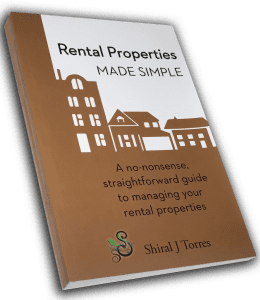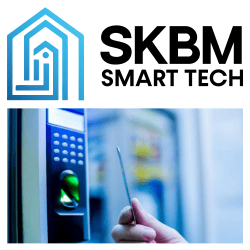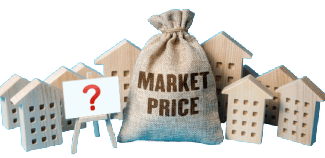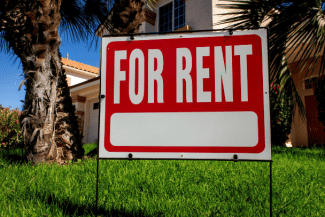5 Steps to Increase Rental Property Cash Flow
By Shiral Torres, Author of Rental Properties Made Simple

I reply, “Before I answer your question, I have some questions for you. How do you manage your finances? Do you have a savings account? How much debt do you have?”
If you’re an over-spender and not good at managing your finances, I encourage you to learn about healthy money management before purchasing a rental property. “Why?” you may ask. Because if you’re not good at managing your finances, and saving money, you would just be setting yourself up for double, or even triple, your debt after you purchase a rental.
Very often my students don’t understand why I’m asking these questions until they hear my reasoning. So, I ask you; “Are you able to manage your finances?” If you’re not, it’s not too late to learn so that you can be a successful and profitable rental property owner.
Creating a budget, following it, and having a savings account are a must when owning rentals. For example, you don’t want to get caught with a plumbing issue you can’t afford, or worse, not have the funds to pay the property tax and insurance when they come due.
Below are some ways to guide you in the right direction.
1. Get clear on where your money goes.
Creating a budget is not as difficult as you think. It’s as simple as using an excel spreadsheet or creating a graph and writing down your expected income and expenses for the year, and then paying attention to it. If you’re new at this, I suggest taking a class on budgeting. You can find them at your local community college, adult school, and your local bank.
2. Organize your bank accounts
Open a separate checking and savings account for your rental. You don’t want to comingle your personal income and expenses with your rental income and expenses. In other words, keep your personal account, or any other non-related income and expenses, in a separate account. The added benefit of having these accounts is that they’ll simplify your income tax preparation, thus saving you time and money. Use your checking account to deposit your rent (and any income). Then pay expenses related to your rental property from that same account. Use your savings account to save for future repairs and big-ticket items.
Tip: Find a bank that has minimal monthly fees, which increases your cash flow. Every little bit helps. If your bank charges fees, ask what their requirements are for an account with no monthly fees. Some banks will waive it if a $1,500 to $5,000 balance is maintained.
3. Grow your savings (cash reserves)
Start an automatic monthly transfer from your checking account to your savings account.
Example:
If your average monthly rent/income is $3,000 and your average monthly expenses are $2,200, you have an average monthly balance of $800. Create a monthly automatic transfer of $500 deposited into your savings account every month and watch it grow. There will be an average of $300 left in your checking account that can be used for purchases made for your rental. The good thing is, if you don’t have any purchases other than your regular monthly expenses, the funds will carry over to the next month. Once you have at least six months of expenses saved up, you can optionally transfer the excess funds into your personal account and start paying yourself. Talk to your CPA or accountant, because the funds you use to pay yourself could become taxable income.
4. Track your monthly spending
It’s important to track your monthly expenses throughout the month so that you’re aware of your balance. Use the same excel spreadsheet or graph you used to create your budget, then write in your actual income and expenses for the current month. Do this every month. If this is a challenge for you, check out my Take Control of Your Finances class, in which you’ll get my simple spreadsheet and learn how to use it. www.simplyshiral.com
5. Be mindful of your spending
Purchase within your means. You may come across a beautiful house in the perfect neighborhood and want to buy it. If you have the funds and the numbers make sense, buy it. But if you don’t or the numbers don’t make sense, skip it and keep looking because there are many properties to choose from.
Avoid impulse buys. You may come across a fantastic sale on an item you buy frequently like light bulbs and wonder if you should purchase a dozen of them. If you have six months of expenses saved up in your savings account, I would say, go for it! If you don’t have your savings built up, buy what your monthly budget can afford. Mindful spending will help you stick to your budget and not overspend. It also helps you save money for big-ticket items and future projects.
These are some steps to guide you as you move toward building your real estate empire. And if you’d like more help building that empire, take a class on budgeting or speak to a financial strategist. Leslie Crumley from Structured Success is my financial strategist. She taught me how to understand my cash flow and how to maximize it. If you’re interested in learning from Leslie, visit her website at www.structuredsuccess.com.
Now that you have basic money management skills, you’re ready to start your rental property empire. Have fun!
Want to learn more? Visit my website at www.simplyshiral.com to view the affordable classes I offer that help you gain confidence and profits.
About the Author


She teaches Rental Property Management at Pasadena City College, Glendale Community College, and Los Angeles Real Estate Investment Club (LAREIC). To simplify the learning process for her student, she divides my classes into individual topics where each class is more than just a class, it’s a program that includes benefits such as a resource library, access to live Q&A, and vetted partners.
To learn more about Shiral, go to https://simplyshiral.com.















 Accessibility
Accessibility